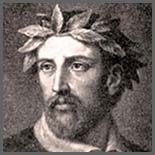 Albertino Mussato (1261 – May 31, 1329) was a Northern Italian statesman, poet, historian and playwright.
Albertino Mussato (1261 – May 31, 1329) was a Northern Italian statesman, poet, historian and playwright.
He is credited with providing an impetus to the revival of literary Latin, and is characterized as an early humanist. He was influenced by his teacher, the Northern Italian poet and proto-humanist Lovato Lovati. Mussato influenced later humanists such as Petrarch.
A native of Padua and a member of its council, Mussato acted as an ambassador between Padua and Emperor Henry VII. He was a member of a group of Latin Paduan poets called the cencolo padovano. Mussato was renowned for his Latin play Ecerinis, which was based on the tyrannical career of Ezzelino III da Romano. It was the first secular tragedy written since Roman times. Thus, it is considered to be the first Italian tragedy identifiable as a Renaissance work. Ecerinis is not only significant for its historical information, but is modeled after the Senecan tragedy and is an indication of the early revival of classical works and their form – a characteristic of the humanist movement.
Mussato received the poet laureate honor as a result of the literary and political qualities of his play. He was one of the first to receive this designation after the classical age. Mussato’s other works are a corpus of letters, poetry, and historical works including a chronicle of Henry VII’s actions in Italy. In addition to his prolific writings, he is also remembered in contemporary accounts as a champion of poetry which he defended in a 1317 polemical exchange of letters with a Dominican friar, Giovannino of Mantua.